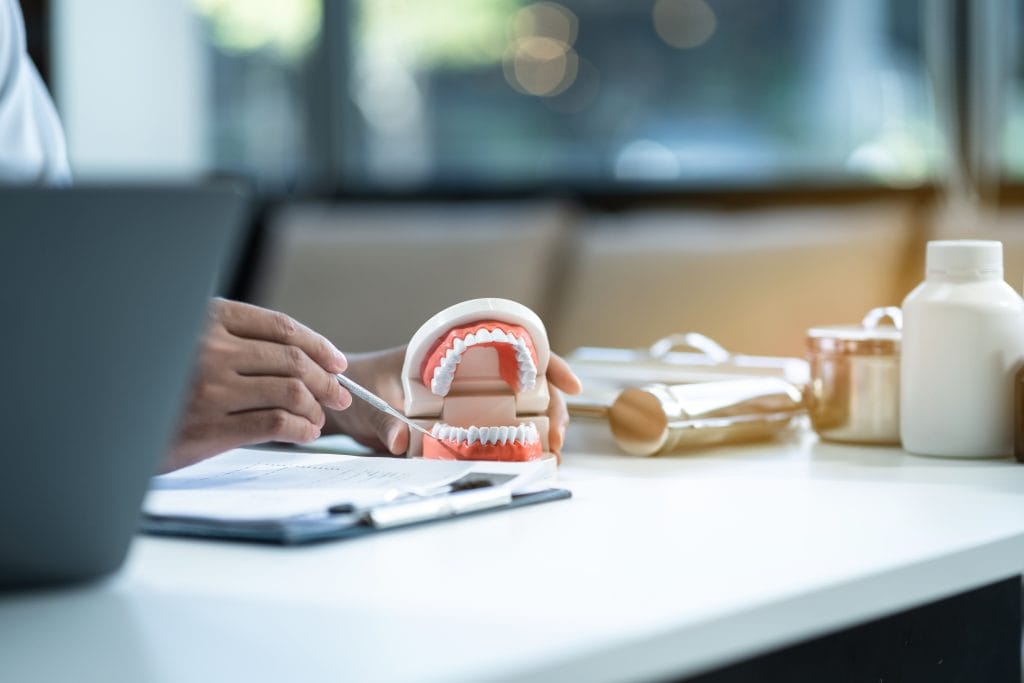Last updated on May 31st, 2023 at 12:33 pm
 Should you hire a full-time person to manage your schedule? (i.e. What people might call a “Schedule Coordinator” or “Scheduler”)?
Should you hire a full-time person to manage your schedule? (i.e. What people might call a “Schedule Coordinator” or “Scheduler”)?
Well, it depends.
Traditionally speaking, administrative staff in a dental office have been given the title of “Front Desk” (named after furniture…not so good), or “receptionist”(…better title). And in the real world, the person answering the phone (the receptionist) is most often the same person scheduling appointments.
As an office grows, the need to specialize and assign specific areas or zones of control so to speak enters in. This might be assigning someone full-time to handle collections. Or, if volume is high, you might see offices with “Treatment Coordinators.” And of course, with this same growth, you or at least someone you know probably has a full-time person managing the schedule (our Schedule Coordinator).
To answer the question we posed here—i.e. hiring a Schedule Coordinator—I’m going to start with another question. Specifically: Are you trying to increase your production and collections?
If you are, there are a few ways you can go about it wrong, and I’d like to cover that first. Follow my logic and you’ll see how this comes back around to the Schedule Coordinator question.
I find that the majority of the time a dentist is looking to increase production/collections, they focus on three things. And by the way…this frustrates me to no end because these three things are not what they should be focusing on.
The Wrong Things to Focus On When Trying to Increase Production
 1. New patients. Of course, there’s nothing wrong with getting new patients—you should get more new patients—but if you’re depending on new patients for production then you’re going to have a tough time. It’s like starting a scratch practice every month. Most production should come from patients of record. If you’ve been in business for a while, you’re sitting on an untapped gold mine with just your existing charts. Read this blog post from Jeff Blumberg to see what I’m talking about: A Fatal Flaw in the Average Dentist’s Business Model.
1. New patients. Of course, there’s nothing wrong with getting new patients—you should get more new patients—but if you’re depending on new patients for production then you’re going to have a tough time. It’s like starting a scratch practice every month. Most production should come from patients of record. If you’ve been in business for a while, you’re sitting on an untapped gold mine with just your existing charts. Read this blog post from Jeff Blumberg to see what I’m talking about: A Fatal Flaw in the Average Dentist’s Business Model.
If you doubt this, I’d suggest you try an exercise: Compare the number of active charts you have to the total chart number. I think you’ll find that there’s enough outstanding treatment in those charts to keep you busy for quite a while if you had someone dedicated to bringing those patients back into the office.
The majority of successful businesses thrive on repeat customers. A restaurant’s best customers are the “regulars.” An accounting firm does people’s taxes every year. A dental office is no different. It is undeniably important to keep patients coming back into the office, so you can address issues as they come up and do any outstanding treatment they haven’t completed yet. It’s great for the practice and best for your entire patient base—and their health! So, of course get more new patients, but place a sharp focus on your existing base.
2. Adding back office/clinical staff (i.e., associates, hygienists, assistants, etc.). Again, there’s nothing wrong with hiring more back office staff as you grow—but it’s something you do because you already have too many patients and too much potential production for the existing staff complement. Nine times out of ten, the problem with a practice that isn’t collecting enough is that they don’t have enough production coming in every day (unless you are accepting too many heavily discounted HMOs or low compensation insurance plans that make profit difficult…in which case you’ve got other problems).
3. Adding some new procedure or technology to the practice. Look, Cerec machines and sleep apnea treatments may be great, but they aren’t going to make you the talk of the town and make your office explode with production. Improve your education and obtain new technology to better service your patients, but don’t expect it to save your practice financially.
So those three things are, in most cases, impractical solutions for increasing production on an immediate basis. Hiring a competent scheduler (or training them properly if you already have one) can be a great solution.
Why?
Well, usually when you fall short of your collections goal for the month, it’s because you didn’t have enough production.
You didn’t have enough production because you didn’t get enough patients to accept treatment that month.
You didn’t get enough patients to accept treatment because you didn’t have enough patients on the schedule with potential or outstanding treatment.
So you can see that it all starts with getting the right patients on the schedule at the right time. That’s the job of the scheduler.
Other reasons you might fall short on production include that patients not being scheduled for treatment, not showing up for treatment scheduled (i.e. cancellations/no-shows) or your day was scheduled so inefficiently that valuable time was wasted.
Again, a well-trained scheduler solves these problems.
Understaffing the Front

Having a front desk person who answers the phones, does insurance, collects co-pays, handles random administrative things and also schedules is like having a hygienist who does hygiene, assists the doctor, orders supplies, confirms the doctor’s and hygiene department’s schedule, and sterilizes all of the office’s instruments. Of course these things would take away from their production and patient capacity as a hygienist. And this is just as crazy as having a “front desk” that’s all over the place. It just doesn’t seem that way because we’re used to looking at the front office differently than the back.
I’m not saying that there can’t be some sharing of duties in the front; the front staff can certainly help each other out on certain things and do some additional duties, but having someone ultimately focused on the schedule is important.
Determining When You Need to Hire a Scheduler
I would say that a scratch practice that is less than six months old does not need a dedicated scheduler yet, depending on the number of new patients and how quickly it’s growing.
In almost all other scenarios, I recommend hiring a scheduler.
What Does the Scheduling Coordinator Do?
 Properly trained, a scheduler can help your practice grow by keeping patients on the schedule, reactivating patients who’ve fallen off, and by making sure there are plenty of case presentation opportunities (this ensures you will have enough production in the future, for more info on this see my blog post A “Full” Schedule is Not Always a Productive Schedule).
Properly trained, a scheduler can help your practice grow by keeping patients on the schedule, reactivating patients who’ve fallen off, and by making sure there are plenty of case presentation opportunities (this ensures you will have enough production in the future, for more info on this see my blog post A “Full” Schedule is Not Always a Productive Schedule).
As far as day-to-day duties, it would look like this:
- Bring a copy of the day’s and week’s schedule to the morning huddle to prepare for the day and identify any holes that need to be filled or changes that need to be made.
- Ensure that any patients in the office are scheduled (in the right spot) for their next appointment before they leave. (This includes scheduling follow-up consultations for patients who didn’t have enough time to receive a full case presentation and accept treatment.)
- Get on the phone to:
- Fill up any times over the coming week that are lacking (the scheduler may know that patient Suzie might be willing to move her appointment up, or patient Joe missed his last appointment and needs to be rescheduled, etc).
- Reactivate patients. Getting overdue patients back in the chair is a major part of the scheduler’s duty. Depending on the number of charts, you may need to assign additional staff to help with this at certain times, but it is ultimately the scheduler’s responsibility to ensure that it’s done successfully on a consistent basis. This is how you build up your hygiene department.
At MGE we’ve designed a Reactivation Program (a series of instructions on how to reach out to inactive patients and get them scheduled) that has been proven to get patients back in the chair. Download it for free here. - Get patients with outstanding treatment scheduled for a checkup/consult.
- Ensure there is a good mix of doctor production (valuable doctor procedures) and case presentation opportunities (consults, new patients, hygiene/checkups) on the schedule every day.
- Confirm upcoming appointments. This comprises a small portion of the scheduler’s day.
- Send recall cards/letters. This also comprises a small portion of the scheduler’s day.
So there you have the daily duties of a scheduler. I’ll wrap up by stressing the importance of training your scheduler. Make sure they know your scheduling policy cold—which of course means that you need to have good scheduling policy in the first place. I highly suggest two options (you could do one or both):
 Use our online course, The Scheduling Coordinator Training Course, to train them to be a superstar scheduling coordinator.
Use our online course, The Scheduling Coordinator Training Course, to train them to be a superstar scheduling coordinator.- Attend the Scheduling for Production Seminar here at MGE.
And remember, practice makes perfect. When you’re training your scheduler, you should also do a bit of roleplaying for practice. Roleplay scheduling a resistant patient for an appointment, a cancellation phone call, a reactivation call, etc. Give all the objections and difficult questions that patients come up with so the scheduler is completely comfortable addressing all of them in a way that results in the patient scheduling and then showing up. On our online course, we provide demonstration videos of how these conversations go, as well as outlines of how to handle them, but it’s always good to practice.
If you’d like help with any of this or have any questions at all, schedule a free consultation here.
Good luck!




Very awesome! Sadly… Great point! Very well done.!
Thats why I am suffering for over 12 years ! Very sadly….
We used to be strong in the back, I am bringing new technology in like laser, sleep medicine etc.etc we still not grow-tying to add back people … nothing is working because of the lack of the front …….
God bless! Tibor